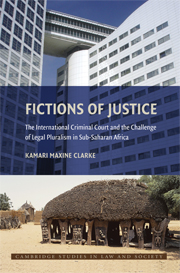 Fictions of Justice
Fictions of Justice Published online by Cambridge University Press: 23 January 2010
SHARIA-IZATION IN NIGERIA, POST-1999
I conducted research in the Nigerian north during the summer months of 2002–5, a turbulent period of both excitement and anxiety about the successful reestablishment of the Sharia code. Of the range of stories I documented, four concerned the criminal sentence of death by stoning rendered by a judge who had also sentenced six persons to limb amputations as punishment for the Sharia crime of sariqah (theft). During the same period, hundreds of persons under Sharia jurisdiction in northern states were sentenced to public caning for varied minor offences such as petty theft, consumption of alcohol, and prostitution. Of special interest to me were those cases in Zamfara State under the lordship of Judge Ghauri, who insisted that he believed the Sharia “was ordained by God.” Also in Zamfara State, the judiciary ordered the amputation of the hand of a young boy convicted of stealing a bicycle in January 2000. This youngster, an indigent from a local village, voluntarily submitted to the Sharia proceeding, including the amputation, choosing not to appeal on the grounds that submission to Allah was necessary to gain redemption for his sins.
In another case, a nineteen-year-old awaited his hearing after being accused of theft. The man who was to be his judge told me and a number of reporters the story of another man who a year earlier had been convicted of stealing a sheep and whose right hand had been amputated as punishment.
To save this book to your Kindle, first ensure [email protected] is added to your Approved Personal Document E-mail List under your Personal Document Settings on the Manage Your Content and Devices page of your Amazon account. Then enter the ‘name’ part of your Kindle email address below. Find out more about saving to your Kindle.
Note you can select to save to either the @free.kindle.com or @kindle.com variations. ‘@free.kindle.com’ emails are free but can only be saved to your device when it is connected to wi-fi. ‘@kindle.com’ emails can be delivered even when you are not connected to wi-fi, but note that service fees apply.
Find out more about the Kindle Personal Document Service.
To save content items to your account, please confirm that you agree to abide by our usage policies. If this is the first time you use this feature, you will be asked to authorise Cambridge Core to connect with your account. Find out more about saving content to Dropbox.
To save content items to your account, please confirm that you agree to abide by our usage policies. If this is the first time you use this feature, you will be asked to authorise Cambridge Core to connect with your account. Find out more about saving content to Google Drive.